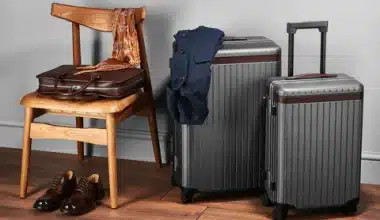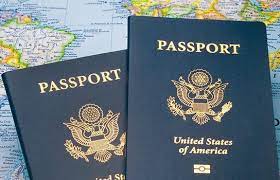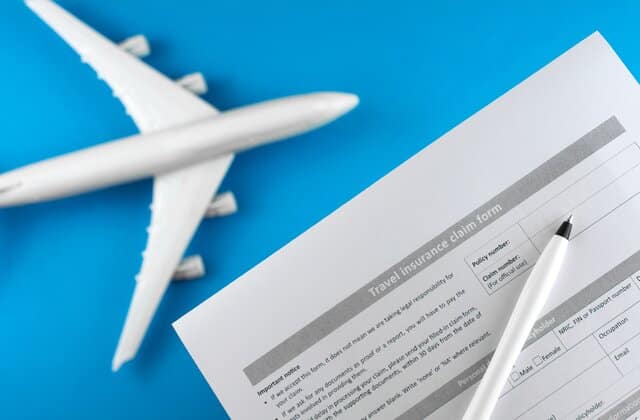Whether you’re looking for a change of scenery, a new job opportunity, or a different way of life, moving abroad can be an amazing experience. However, it can also be a stressful grind. There’s a lot of research and planning involved in making a move to another country happen. But don’t worry; we’ve got you covered.
This article will walk you through the entire process of moving to another country, from finding the right destination to getting your visa and finding a place to live. We’ll also share some tips and tricks to help you make the most of your new life abroad.
So without further ado, let’s jump right in…
How to Move to Another Country
#1. Begin Saving for Your Move — And Add an Extra 10% On Top of That.
Moving down the street can be costly, but multiply that by ten, and you’ll get close to the cost of relocating across the world. Global living expenses include standard items such as housing deposits, movers, and transportation, but they also include some fun extras such as visa documents, international insurance, and the potential need to hire a lawyer to help you through it all.
When moving abroad, the age-old advice of having six months’ worth of savings becomes sound, but that should really be the bare minimum. Begin by researching exchange rates and the cost of living in your new home, then work with your income to create a monthly budget that fits your move. Then, try to save six months’ worth of that budget before your move so you’re prepared for any surprises.
#2. Apply for or Renew Your Passport as Soon as Possible
To apply for a visa, you must have a valid passport. Some countries require you to keep your passport valid for at least six months after your return date. If you do not have a set return date and your passport expires while you are abroad, you can renew it at your nearest U.S. consulate. A consulate or an embassy.
#3. Find a New Place
Whether you already know which city you’ll be moving to or are keeping your options open, deciding where you’ll live is one of the most exciting aspects of moving abroad. If you fell in love with a country and could see yourself living in the hustle and bustle of its capital city or sunning on the coast, do some research on what each potential city has to offer. In addition to the type of lifestyle you seek, consider city size, public transportation, and health care infrastructure.
Even if you know where you’re going, you’ll still need to find a place to stay. If you intend to rent, begin by researching the most popular online listing website and connecting with local rental agencies. Arranging a rental contract before you arrive can be difficult, so you may need to stay in a hotel or on Airbnb for the first week before beginning your search in earnest once you arrive. If you want to buy a house, you should definitely plan a trip ahead of time and work with a realtor so you can compare your options and see each place in person.
#4. Prepare Your Family for the Relocation
If you’re not just moving abroad for yourself but also for your partner, children, or pets, you may have a lot more work to do. Aside from the additional paperwork, you will also need to consider their future in your new home. Before you fully commit to the move, you should research potential job opportunities for your partner and schooling options for your children. Fortunately, your pets’ lives will most likely continue as usual, but you should plan ahead of time how you’ll get them there.
#5. Make a Visa Application
Obtaining a visa is perhaps the most nerve-racking aspect of moving abroad, as they can deny you for any reason at any time. To help mitigate that risk, check the official government website of your destination to see what supporting documents you’ll need for your application and make sure everything is in working order.
For example, if you’re applying for a student visa in the United Kingdom, you’ll need to provide a copy of your university’s offer letter as well as proof that you’ll be able to support yourself during your studies. You may also be required to make an appointment at the U.S. To submit your biometrics (for example, fingerprints and a photograph), go to the Department of Homeland Security application support center. To avoid stress, give yourself plenty of time to gather these documents before your visa appointment.
#6. Accept That Nothing Will Be Easy
If dealing with bureaucracy at home is difficult, try doing it backward and in heels — that is, with a foreign government and in another language. It is not impossible to DIY the process of obtaining the information required to apply for a visa and establish your residency abroad, but it will be difficult, and, almost certainly, you will come across conflicting information about what types of forms you require and who you must send them to.
If you intend to stay in another country for a short period of time, such as three to six months, you may be able to keep your tourist status without applying for a visa.
On the other hand, if you are considering a permanent move and are facing a more difficult visa process, consider hiring an immigration lawyer in your destination country. If you are applying for a student visa, your school of choice may provide this service. If possible, try to get a personal recommendation, and before you commit, read reviews and testimonials.
#7. Consider Health Care
Health care varies greatly around the world, and your ability to access a local system may be contingent on the type of visa you hold. Find out if your current healthcare provider will cover you while you’re away. Also, take the time to request medical records from your doctors and get all necessary immunizations. You can find out which ones you’ll need all over the world by clicking here. You’ll also need to determine whether or not your prescription medications are legal in the country and whether or not they are easily accessible. If not, bring an extra supply with you or figure out another way to get them.
Once in your new country, it’s a good idea to learn about the local healthcare system and whether you have access to it due to your visa status. In Portugal, for example, you need a residency card to obtain a health number, which allows you to participate in the country’s healthcare system, but you must first go through all the proper channels.
#8. Sign Up for STEP
Enroll in the U.S. to stay informed. To get the most up-to-date information about your new country’s safety conditions, enroll in the Embassy’s Smart Traveler Enrollment Program (STEP). Your participation will also benefit the United States. In the event of an emergency, whether it is a natural disaster or a family matter, the Embassy will promptly notify you.
#9. Conduct Extensive Research
Even if you know where you’re going, you’ll need to do a lot of research to prepare for the big move. Among the many questions you should ask and consider are:
Shipping vs. Storage vs. Selling
Will you have your belongings shipped to your new home or stored in your home country? You should consider the logistics and costs of each, which can total thousands of dollars. If you’re making a more permanent move, you might want to sell your belongings.
Find out now where you can buy must-have items like furniture, bedding, kitchen appliances, and utensils if you’re planning to move abroad with two suitcases and a carry-on.
Transportation
Will you drive, or will you take public transportation to your new location? If you intend to drive, weigh the benefits and drawbacks of shipping your car, purchasing a new one, or renting a car. Depending on the country you live in, you may also need to obtain an International Driving Permit (IDP) before moving (as well as a new driver’s license).
Check the local driving regulations in your destination country, as the IDP is often only valid for a limited time. In Spain, for example, you only have six months of residency before you must begin the lengthy process of obtaining a Spanish license, which requires you to complete a Spanish driving course and pass the test.
Culture
Prepare for the big move by researching the history of your new home and how its government currently operates. Read up on its social norms and etiquette, watch books and movies set in the country, and learn a few words and phrases if you’re moving to a country where you don’t speak the language.
Culture shock can be mitigated and social faux pas avoided by researching and understanding the culture. If you don’t already speak the language, consider taking classes or, at the very least, downloading a language-learning app to help you fit in and make new friends.
#10. Contact Your Bank
The Expat’s Manual recommends maintaining your current bank account in order to maintain your credit score and make direct payments for any outstanding bills or loans. However, you must notify your bank and credit card company of your relocation, and you should consider getting an international credit card to avoid foreign transaction fees. You should also look into banks in your new city to see what paperwork is required to open a savings or checking account.
#11. Purchase a New Phone Plan
When you move abroad, you’ll need to stay connected in order to go about your daily business, and hopping from free WiFi point to free WiFi point won’t suffice. International phone plans are expensive, so request that your smartphone be unlocked before you leave. When you arrive in a foreign country, you can buy a SIM card from a local carrier and replace it with the one on your phone to make local calls with ease.
Consider switching to a virtual phone services provider like Grasshopper or a mobile virtual network provider like Google Fi if you want to keep your old phone number from back home. These services allow you to manage your accounts online and keep track of any messages you receive from family and friends back home.
#12. Contact Your Accountant
Even if you’ve been living abroad for more than a decade and haven’t returned once, all American citizens are required to file their taxes annually — often in addition to the taxes they file abroad. However, you may be eligible for certain exemptions, so it’s a good idea to hire an accountant who can help you navigate two different tax systems.
#13. Make Duplicates of Vital Documents.
Make copies of all important documents, such as your passport, driver’s license, birth certificate, immunization records, and visa information. These duplicates will be useful for any residency appointments. If you must store this information online, make sure to use a secure website with two-factor authentication to protect your identity.
#14. Throw a Farewell Party
Say goodbye to your friends and family with one last hurrah (complete with all of your favorite comfort foods) and prepare for the most unforgettable experience of your life. Then, invite them all to come visit you so they can see your new home for themselves. Yes, it will make you sad, but know that there are only good things ahead that will bring you new joys you never imagined before.
#15. Make Contact With Other Expats
Moving abroad is a daunting process, but you are not alone. Expats are some of the friendliest people you’ll meet while living abroad. They are frequently eager to pay it forward by sharing advice on navigating local bureaucracy and recommending lawyers, accountants, and other services you may require when navigating the nitty-gritty of living abroad. There are many online forums for expats, but you should try to find a group for people who live in your city, as there may be meet-ups where you can connect in person — you might even make some new friends!
How to Move to Another Country Checklist
Check Visa Requirements
When planning a move abroad, the first thing you should do is research your destination’s visa requirements and immigration options. Unless you are an EEA/EU country national moving within the EEA/EU, you usually need a long-stay visa to move.
Some countries have a variety of immigration programs, most of which are work-based, points-based, or require a sponsor. So you must conduct some research to determine which program is best for you.
Prepare Your Documents
Birth certificates, marriage licenses, adoption papers, medical records, and child custody should all be prepared and ready to go with you. Also, don’t forget to bring your passport. You must ensure that it is current and valid.
If you do not have a passport, you must apply for one at your country’s relevant authority. You must first complete this step because you cannot apply for a visa without a valid passport.
Create a Timeline for Your Move
The entire visa process, from preparing your documents to applying for and receiving your visa, could take several months. However, once your visa is approved, most countries give you 30 days to enter the country. So, make sure you finish all of your preparations when you believe the visa will be granted.
Furthermore, you should consider whether it would be easier for you to relocate first and then bring your family members. You should create a schedule that works for everyone and allows you enough time to sort everything out.
Prepare Your Pet
If you are transporting pets, you must check the country’s pet entry requirements. The rules vary by country, but in general, you must follow the following guidelines:
- Your pet must be rabies-vaccinated.
- Your pet must have a passport to travel.
- A health certificate for your pet is required.
- Your pet should be travel-ready (carrier crate, transportation, and paid airline fees).
- Exotic pets are subject to different rules than common household pets (cats, dogs, and birds).
Review Your Tax Obligations
You may still be required to pay taxes in your home country if you relocate to a new state. As a result, before you depart, check with the tax authorities and review the tax treaties between your state and the destination country.
Prepare Insurance and Investigate the Health-Care System
Some countries provide free public health care to all citizens and residents, so you may not need health insurance when you relocate. Nonetheless, expats prefer to have private health insurance to ensure that everything is covered. You should also get travel insurance to cover the trip until you find a job.
Sort Through Your Previous Housing Situation
If you own a home or apartment in your home country, you should consider selling it and using the proceeds to fund your trip abroad. However, if your new country does not work out, you have the option of renting out your property while still owning it. But first, you should be prepared for the numerous responsibilities that come with being an expat landlord.
This decision will be influenced primarily by your housing situation in your country, but keep in mind that mortgage terms may not always allow you to rent.
Make Flight Arrangements
Flight tickets can be expensive depending on the distance between your home country and your destination, especially if you have to pay fees for your pet. The price can be increased to $2,000.
So, do some research and find the cheapest airline you can find–and if you have the option, use your frequent flyer miles to get a discount. Also, call the airline a few days ahead of time to confirm the date and time of your flight.
Prepare Your Items for Shipping
If you want to bring your belongings with you, you must prepare them for shipping. First and foremost, check customs regulations and whether you are required to pay taxes on your items. Then, find the cheapest shipping option for your items. You can ship them by air, ship, moving truck, or train, depending on where you’re going. Sirelo connects you with the leading international moving companies.
Prepare your Finances situation
You must ensure that you have sufficient savings to make this financial move. Then you must find banking options that suit your needs. First, inquire with your local bank about opening an account in your new country. If not, check to see if international transactions are possible and if your cards will work (this option may incur high transaction fees).
The most difficult aspect of moving is that you need a bank account to rent, but you can’t rent if you don’t have one. You can, however, use mobile banks and banks that offer international accounts to non-residents. Most expats prefer to use international money transfer services that are less expensive than traditional banks.
Resolve Your Domestic Issues
Before you move, there are a few things you must do in your home country:
- Inform your friends and family of your relocation.
- Cancel any subscriptions you have.
- Prepare to switch mobile providers.
- Resolve any outstanding bills and debts.
- Arrange for your mail to be forwarded to your new address.
Is it difficult to Move to Another Country?
Overall, moving abroad is difficult if you don’t have a job or money. This, however, is dependent on where you are coming from and where you are going. Each country carefully regulates its immigration programs to ensure that overpopulation does not occur, and they allow entry to people who can benefit the economy and development of the country they are desiring to move to.
How Much Does to Move to Another Country Abroad Cost?
You must have at least $20,000 to relocate abroad. However, the cost varies depending on where you are moving, whether you are renting or purchasing, whether you ship your entire belongings or not, and whether you are moving alone or with family/pets.
Can I just up and Move to Another Country?
However, in general, you can relocate to another country without a job. Each country has its own set of visa requirements and entry requirements, which can be quite stringent when it comes to working. Regardless, you can relocate to another country without a job. Every day, people do it.
How to Move to Another Country:Related Articles
- How to Move to Another State: Step-by-Step Guide
- Sending Money Abroad Online: Tips and Tricks
- Will Relocating Your Business to a Cheaper City Pay Off?
- How Long Does It Take To Get a Passport: All You Need
- Buying a Business Online: Expanding Operations and Reaching New Markets






